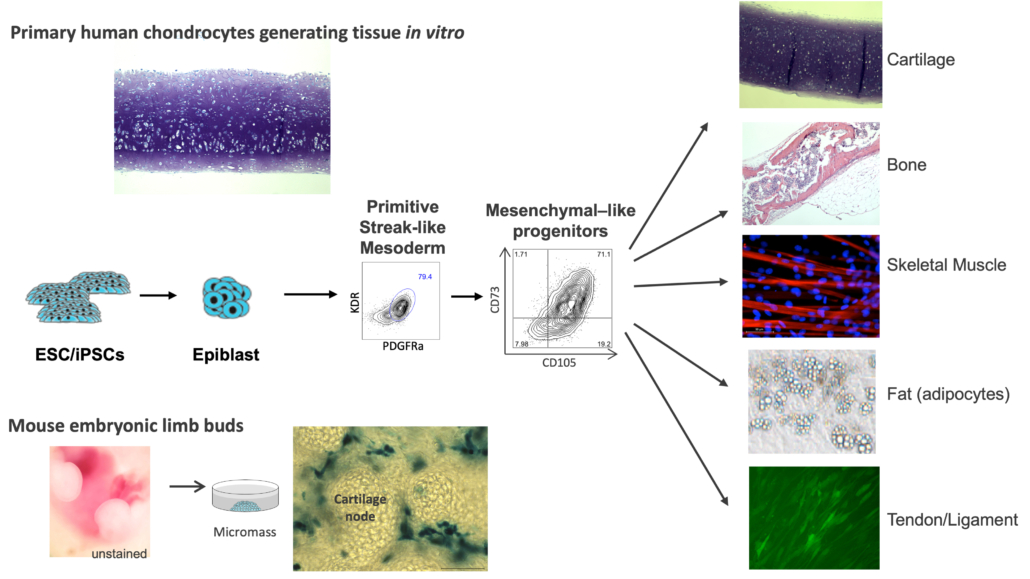Directed Differentiation Core
Images
Core Mission
Stem and progenitor cells provide opportunities to investigate outstanding questions in developmental biology, discover drugs with desired biological activities, develop cell and tissue-based therapeutics and model tissue interactions and diseases in a dish. However, the knowledge, cost and infrastructure required to establish these models is a deterrent, if not roadblock, for most investigators. The Directed Differentiation Core was established to minimize risks and facilitate successful use of pluripotent stem cell models in musculoskeletal biology.
The Core is experienced in modulating variables during in vitro culture of pluripotent stem cells, their intermediate derivatives and musculoskeletal lineage cells, as well as in defining relevant outcomes to address outstanding questions. The Core aims to provide hands-on training in these methodologies, to support the development of new protocols and to assist Center members with bringing protocols into their laboratories.
Services
- Consultation support for investigator-driven projects and experimental design
- Hands-on training and production of human and mouse PSC/iPSC/ESC stocks for experimentation, mesoderm progenitors, musculoskeletal progenitors, and chondrocytes and cartilage tissues
- Expansion of newly generated human iPSCs/ESCs and mouse PSCs
- Derivation of appropriate culture conditions and media compositions to support novel protocols
- Troubleshoot existing protocols
- Culture and manipulation of primary human skeletal cells (e.g., chondrocytes and connective tissue lineages), mouse embryonic limb bud culture
Equipment and Resources
- Supportive educational infrastructure for the derivation of mesoderm and endoderm lineages, articular and growth plate cartilage tissues
- Access to tissue culture facilities equipment, and stem cell lines in the Core
- Lot-tested reagents purchased in bulk to minimize variability in PSC differentiation cultures
- Companion access to confocal microscopy and flow cytometry equipment
Fee Structure (Please contact Dr. Craft at april.craft@childrens.harvard.edu):
- Consultation with Dr. Craft (required)
- 1 hour complementary to CSR members and trainees; over 1 hour – $100/hr
- Training or production in Craft lab
- IPSC/ESC expansion and creation of master stock and working stocks (~50-100 vials total) ~ $1450
- Human iPSC/ESC directed differentiation (full-length experiment) ~ $2000-2600
- Imaging: EVOS fluorescent microscope, Leica bright field microscope, Zeiss confocal
- Flow cytometry available ($45/hr + antibody) in BCH core via Craft lab
- Other analyses such as RNA/histo at investigator’s expense
- Mouse ESC/iPSC expansion and/or differentiation ~ $700-900
- Mouse limb bud micromass training ~ $550-900 (timed pregnant mice can be purchased if needed)
Dr. Craft holds bioinformatics meetings every Thursday. Please contact april.craft@childrens.harvard.edu for the Zoom link.


